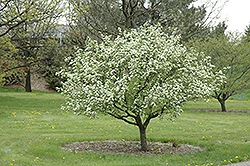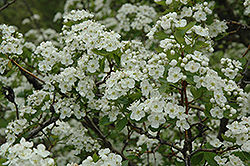It's all about ...
plants

Height: 15 feet
Spread: 15 feet
Sunlight:
![]()
Hardiness Zone: 3a
Description:
Attractive foliage, form, flowers and fruit make this small ornamental tree a winner; beware of long, purplish brown spines; delicious fruit attract birds, can sometimes be affected by rust
Ornamental Features
Cerro Hawthorn is bathed in stunning clusters of white flowers held atop the branches in late spring. The fruits are showy black pomes carried in abundance from early fall to late winter. It has dark green deciduous foliage. The serrated round leaves do not develop any appreciable fall colour.
Landscape Attributes
Cerro Hawthorn is a deciduous tree with a more or less rounded form. Its average texture blends into the landscape, but can be balanced by one or two finer or coarser trees or shrubs for an effective composition.
This tree will require occasional maintenance and upkeep, and is best pruned in late winter once the threat of extreme cold has passed. Gardeners should be aware of the following characteristic(s) that may warrant special consideration;
- Disease
- Spiny
Cerro Hawthorn is recommended for the following landscape applications;
- Accent
- Hedges/Screening
Planting & Growing
Cerro Hawthorn will grow to be about 15 feet tall at maturity, with a spread of 15 feet. It has a low canopy with a typical clearance of 2 feet from the ground, and is suitable for planting under power lines. It grows at a slow rate, and under ideal conditions can be expected to live for 40 years or more.
This tree should only be grown in full sunlight. It prefers dry to average moisture levels with very well-drained soil, and will often die in standing water. It is considered to be drought-tolerant, and thus makes an ideal choice for xeriscaping or the moisture-conserving landscape. It is not particular as to soil type or pH, and is able to handle environmental salt. It is somewhat tolerant of urban pollution. This species is native to parts of North America.

